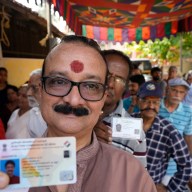They’re the four words all commuters and travelers have come to know by heart over the last decade.
See something? Say something.
The vigilance campaign has been drilled into the heads of the traveling public, and it’s just one of the many security measures that have been enacted since shortly after Sept. 11, 2001.
While security officials and law enforcement attribute those measures to making the traveling public safer, not everyone sees the benefit of every program enacted.
“The executive branch has taken advantage of our technological revolution and … in the atmosphere of continued fear-mongering, Congress has not only failed to curb the executive violations, but has ratified them,” said Hina Shamsi, the director of the national security project for the American Civil Liberties Union. “In the 10 years since, the reality is: For all of the resources and our national treasury that has been spent on surveillance, there is no objective evidence that we are safer.”
The ACLU has continually scrutinized various programs put in place after the 9/11 attacks.
Most recently it has filed a Freedom of Information lawsuit against the government for what it said is a failure to release documents about the FBI’s nationwide system of collecting and sharing reports from local and state agencies about “vague and expansively defined suspicious activity.”
It also sued on behalf of U.S. citizens on the “no fly” list, and three years ago lost an attempt to sue against the Bush Administration’s warrantless wiretapping program.
For Donald Hafner, a political science professor at Boston College whose teaching field includes national security, the issue goes beyond the question of privacy.
“You used to visit government buildings in Washington or go watch Congress in session … now we have concrete barriers around buildings,” Hafner said. “Maybe it is stranger to think of a world in which that didn’t exist. The psychological impact on American society is something not to be dismissed.”
While some measures have proven worthy, Hafner said, others might not be worth their price.
“We are safe, but we are doing a lot of things which are costly and a fair number of things probably which are not justified and have not contributed to our domestic security,” Hafner said.
For those in charge of ensuring the safety of travelers, the changes in security over the last 10 years have proved worth it.
Despite the outcries from organizations and the public when body imaging scanners were introduced or other methods were implemented, officials said it’s an issue of education.
“Once we educate people on what we’re doing, they’ll understand why we’re doing it,” said George Naccara, the Transportation Safety Administration’s federal security director for Massachusetts.
“Improved security education and outreach, sending the proper message — all of that is important.”
Naccara said in a recent interview that he feels Logan Airport, which served as the launching point for the two planes that eventually crashed into the World Trade Center towers, is “unequivocally” safer than 10 years ago.
He attributes that to personnel training and technology, like the eventual adaptation of electronic analysis that would utilize software to pull up a traveler’s flight history and criminal record and send that information to the checkpoint to assess the risk.
“That thought has always kept the leadership of the airport focused,” he said. “The leaders here have never forgotten what happened here and have vowed to never have that happen again.”

















